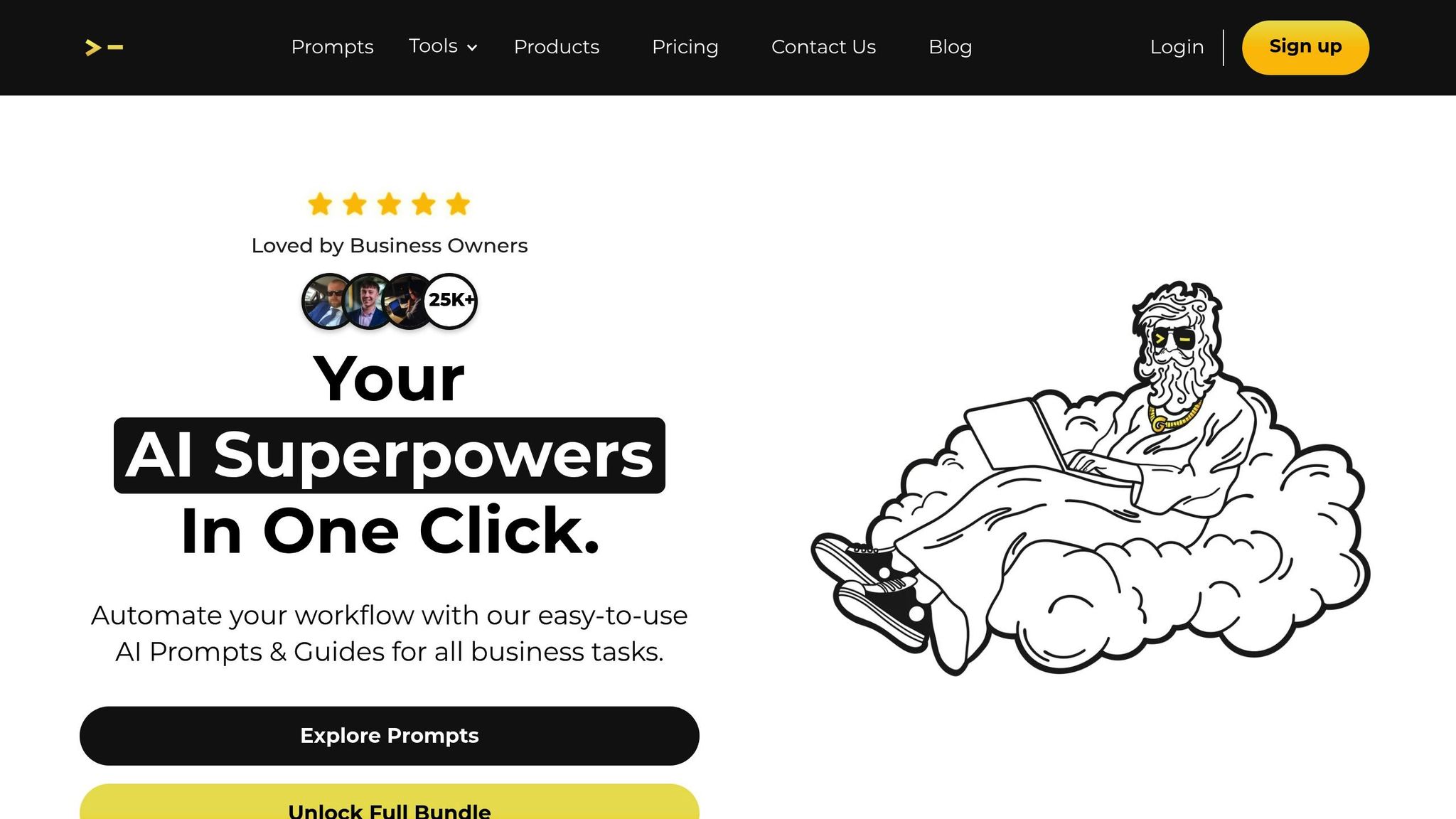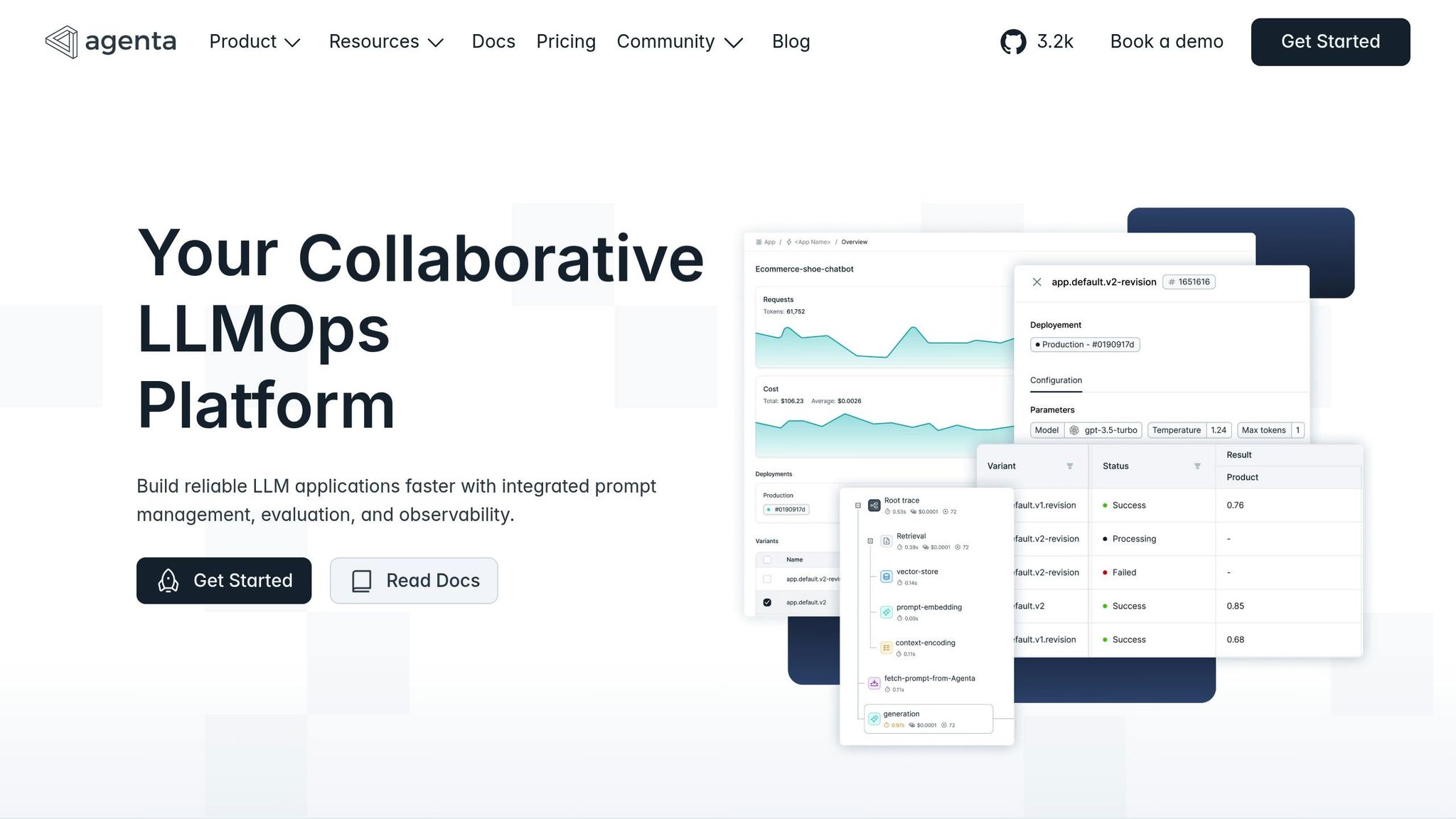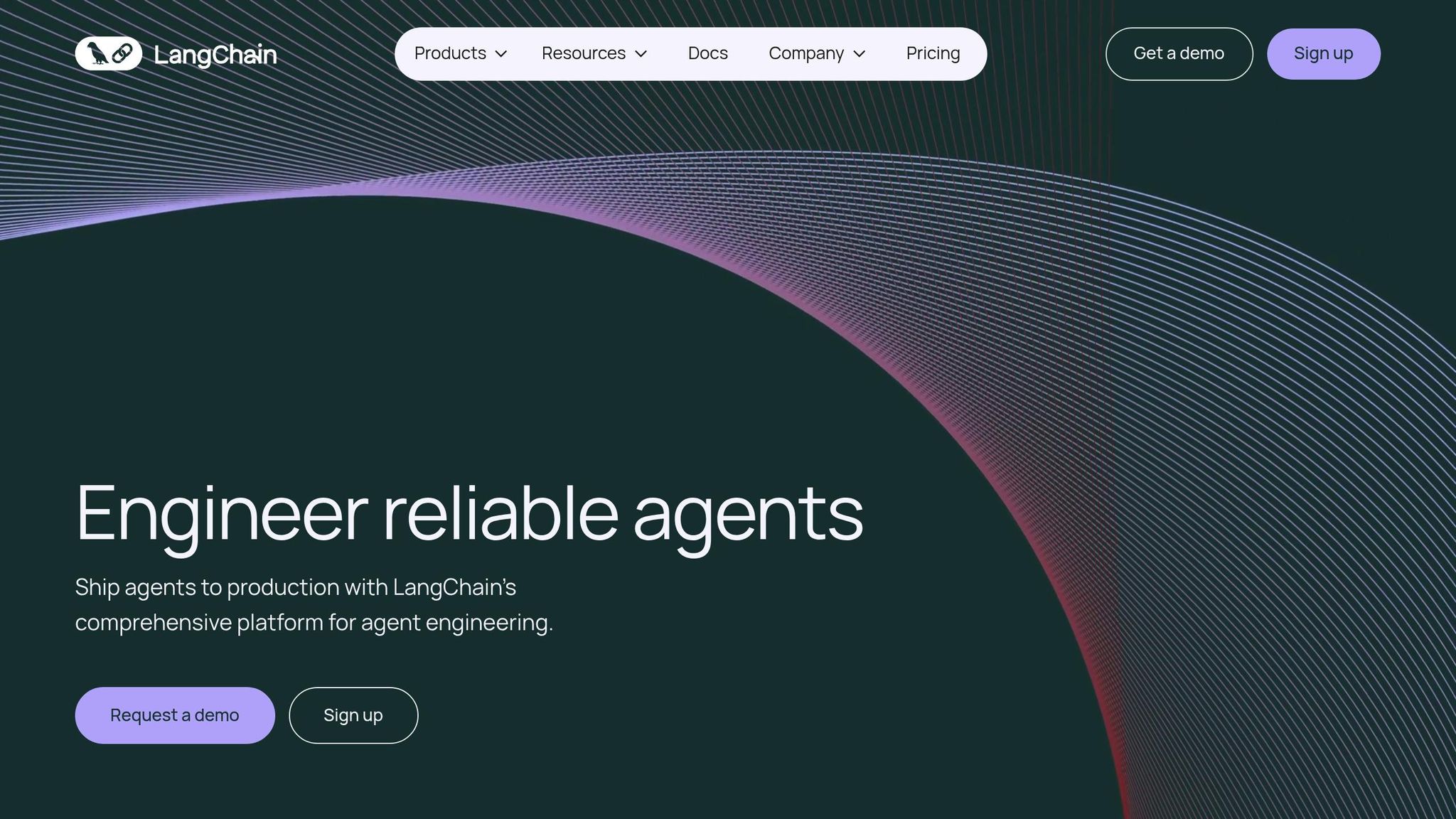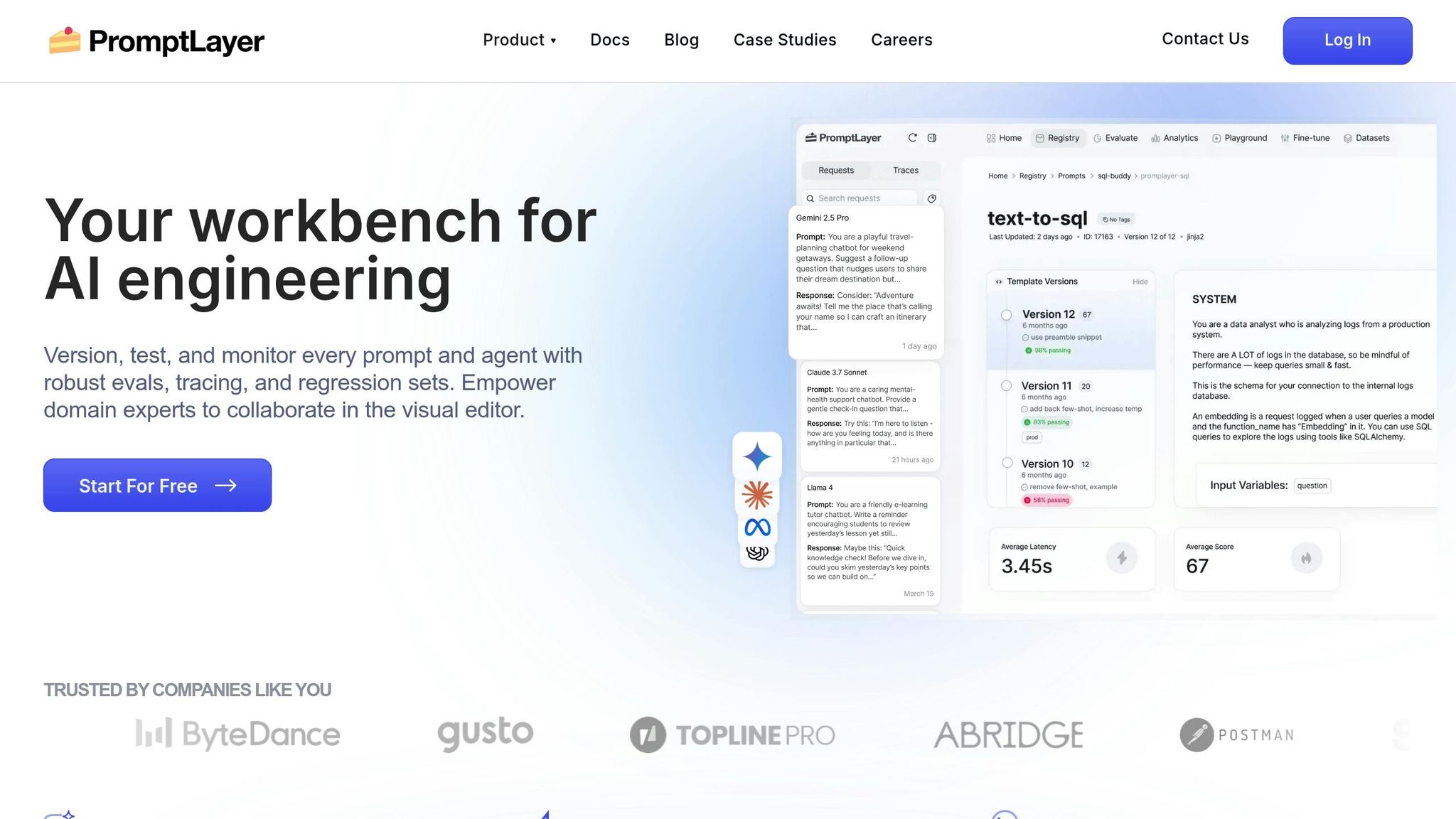
Browser-based prompt extensions are simple to use but often fail to meet the needs of professionals and businesses. They rely on internet access, lack compatibility with multiple AI models, and have limited scalability for advanced tasks. Additionally, they raise concerns about data security and can become expensive with recurring subscription fees.
Here are better alternatives for managing AI workflows effectively:
For a quick overview, see the comparison table below:
| Platform | Offline Access | Multi-Model Support | Key Features | Pricing |
|---|---|---|---|---|
| God of Prompt | Yes | Yes | 30,000+ prompts, business-focused categories | $37–$150 (one-time) |
| Agenta | No | Yes | AI Model Hub, secure team collaboration | Subscription-based |
| LangChain | No | Yes | Open-source for custom AI app development | Free (with infrastructure costs) |
| PromptLayer | No | Yes | Centralized prompt logging, A/B testing | Subscription-based |

God of Prompt is an offline solution built within Notion, designed to bypass the limitations of browser extensions while offering greater flexibility, customization, and long-term utility. Here’s how it addresses professional needs effectively.
Unlike browser-based tools, God of Prompt works seamlessly with multiple AI platforms, including ChatGPT, Claude, Midjourney, Gemini AI, Grok, Veo, and Sora. Its library is packed with prompts tailored to match the strengths of each model. For instance, you’ll find prompts fine-tuned to maximize the unique capabilities of Midjourney for visuals or ChatGPT for conversational tasks.
God of Prompt takes productivity to the next level by organizing its extensive prompt library into business-specific categories like marketing, finance, e-commerce, SEO, sales, and productivity. Each category is stocked with hundreds of prompts crafted by experts to tackle specialized tasks.
Need something more tailored? The platform also includes tools for custom prompt generation and engineering, along with guides to help you create bespoke solutions. Plus, the Custom GPTs toolkit offers pre-made templates for tasks like customer service, content planning, and market research - eliminating the hassle of starting from scratch.
God of Prompt offers a one-time purchase model that consolidates all its features, making it a cost-effective choice for professionals. Here’s what’s included:
All purchases come with lifetime updates, ensuring your library stays relevant as AI technology evolves. To make the decision easier, the platform includes a 7-day money-back guarantee and a free tier. The free version lets you try out over 1,000 ChatGPT prompts, 100 Midjourney prompts, and 10 Mega-Prompts - giving you a no-risk way to evaluate its quality before committing.

Agenta stands out with its ability to support multiple AI models through its AI Model Hub. Whether you're using models from Azure OpenAI, AWS Bedrock, or even self-hosted and fine-tuned options, Agenta can integrate them seamlessly. Its compatibility with any model featuring an OpenAI-compatible API makes it a versatile tool for teams looking to streamline their workflows.
Agenta's platform is designed to work with a wide range of models:
"Azure OpenAI, AWS Bedrock, self-hosted models, fine-tuned models – any model with an OpenAI-compatible API." – Agenta
Once a model is connected, it can be used consistently throughout various stages of development. This eliminates the hassle of reconfiguring models repeatedly, saving teams both time and effort.
But Agenta doesn’t stop at integration - it also simplifies collaboration while keeping security in mind.
Agenta ensures secure team collaboration by allowing controlled access to models without exposing sensitive API keys. Teams can work efficiently while maintaining strict permission settings for each model.
"Give your team access to models without sharing API keys. Control permissions per model." – Agenta

LangChain breaks free from the constraints of browser-based tools, allowing developers to create custom, cross-platform AI applications tailored to a wide range of needs.
LangChain's design makes it compatible with nearly any language model provider. It includes built-in connectors for OpenAI, Anthropic, Google, Cohere, and even custom models.
This adaptability allows development teams to seamlessly switch between models without the hassle of rewriting application logic. By offering a standardized interface, LangChain simplifies the differences between AI providers, making it easier to test various models or transition to new ones as they emerge.
On top of that, LangChain takes care of critical tasks like rate limiting, error handling, and response formatting. This reduces the workload for developers and ensures a smoother integration process. But LangChain doesn’t stop there - it also includes features designed with businesses in mind.
LangChain goes beyond technical functionality by offering enterprise-grade tools that browser extensions typically lack. One standout feature is LangSmith, a monitoring and debugging platform that provides detailed insights into model performance, cost tracking, and usage analytics across teams and projects.
For organizations handling sensitive data, LangChain supports on-premises deployments and custom security configurations. Its modular structure is designed to grow alongside business needs, making it an excellent choice for industries like healthcare and finance, where strict data governance is essential.
Teams can start small with basic prompt templates and gradually incorporate advanced capabilities like memory management, document retrieval, and multi-step reasoning workflows.
LangChain is open-source and free to use, but teams should account for development, infrastructure, and API expenses. For those with technical expertise, this upfront investment pays off in the long run, offering greater customization, cost efficiency, and the freedom to avoid vendor lock-in.

PromptLayer serves as a centralized hub for logging and analyzing interactions between your applications and AI models.
PromptLayer is designed to work seamlessly with a variety of AI models, offering multiple ways to integrate them. It directly supports OpenAI models, such as the text-ada-001 engine, through standard API calls. For those using the LangChain framework, PromptLayer provides integration options that open the door to a wide range of models within that ecosystem. Its Custom Providers feature allows users to connect with virtually any AI model provider, giving unparalleled flexibility. On top of that, the platform includes a general REST API, which makes it possible to log requests and responses from any AI service. These diverse integration options simplify the process of tracking and analyzing AI interactions, making it easier to manage complex technical setups and enabling scalable business applications.
PromptLayer is built with enterprise needs in mind, offering tools that go beyond basic browser extensions. Its centralized prompt management system allows teams to store, version, and deploy prompts across different AI models and use cases, ensuring efficient organization. The platform also includes A/B testing capabilities, enabling teams to compare how various AI models handle the same prompts. A scoring and ranking system further helps identify the most effective prompts and models for specific tasks. To make organization even easier, its advanced search tools let users filter and locate requests based on metadata, such as user IDs, session IDs, or model names, using custom tags. Moreover, PromptLayer supports agents and multi-turn chat scenarios, making it an excellent choice for building sophisticated AI solutions that require seamless context management and smooth conversation tracking.
Taking a closer look at the platform reveals some clear benefits along with a minor trade-off.
God of Prompt offers an extensive library of over 30,000 AI prompts tailored for a range of professional tasks like content creation, marketing, SEO, and more. The prompts are neatly organized within Notion, making it easy to browse through categorized bundles based on your needs.
One of its standout features is the one-time payment model. For example, the Complete AI Bundle costs $150.00 and provides lifetime access. This means no monthly or annual fees, which makes it a cost-effective solution for professionals and entrepreneurs looking for long-term value.
However, there is a slight downside. Since the platform operates through Notion, you'll need to manually transfer prompts to your preferred AI tools. While this manual step might feel inconvenient for users who prefer automated workflows, it does come with an upside: the flexibility to adapt and use the prompts offline, integrating them seamlessly into your own processes.
Improving the limitations of browser extensions requires a focus on efficiency and long-term benefits. To tackle the challenges discussed earlier, it’s essential to explore alternatives that align with your workflow and business objectives.
When considering options, three key factors should guide your decision: usability, scalability, and cost-effectiveness. Research shows that well-designed prompt engineering can achieve results comparable to AI model optimization, making it crucial to choose a solution that supports continuous improvement and refinement.
One persistent challenge is the difficulty many professionals face in articulating their needs through written prompts. This highlights the value of solutions that include structured, pre-tested prompts while still allowing room for customization to address specific requirements.
A standout example is God of Prompt, which offers a budget-friendly and comprehensive approach. With a one-time payment starting at $37.00 for specialized bundles or $150.00 for full access to over 30,000 prompts, it eliminates recurring subscription fees. Additionally, its Notion-based setup ensures offline accessibility and smooth integration, making it a practical choice for teams looking to streamline their workflows.
For sustained efficiency, businesses should prioritize solutions that minimize computational strain and allow for iterative prompt refinement. While each platform has its strengths, the ultimate goal should be to meet your team’s unique needs without introducing unnecessary complexities.
Whether you’re looking for ready-made prompt libraries, tools for custom development, or enterprise-level monitoring capabilities, the right platform should enhance your AI processes while keeping things simple and effective. Choose the one that aligns with your team’s expertise, budget, and operational goals.
Offline prompt tools, like those from God of Prompt, bring some clear benefits compared to browser-based extensions. One major perk is better control over data security and privacy. Since these tools run directly on your device, your sensitive information stays with you, giving you peace of mind and making it easier to meet data compliance requirements.
Another advantage? They don’t rely on cloud services or an internet connection. This means you can use them anytime, anywhere, without worrying about connectivity issues. Plus, offline tools can be tailored to your specific needs, offering improved performance and reliability - perfect for professionals and business owners focused on boosting productivity and achieving higher returns.
Using tools with multi-model compatibility can transform business workflows by providing access to different AI models on a single platform. This setup allows users to select the best model for each specific task, improving both precision and productivity.
With multiple models integrated, these tools make it easier to compare outputs, save prompts, and organize files in one centralized workspace. This not only cuts down on time and effort but also simplifies processes, offering a practical solution for professionals and entrepreneurs aiming to refine their AI-powered operations.
When choosing between a subscription-based AI tool and a one-time purchase like God of Prompt, it's essential to consider your budget and long-term goals. A one-time payment gives you permanent access to the product, making costs more predictable and saving you money over time. This option is especially appealing for professionals and entrepreneurs who need dependable tools to streamline their work.
Subscription models, on the other hand, may be better for short-term projects or for users who value regular updates and more flexibility. However, the recurring fees can add up, making them a pricier option in the long run. If you're looking for a high-quality AI prompt library without the hassle of ongoing payments, a one-time purchase like God of Prompt is a smart choice.






